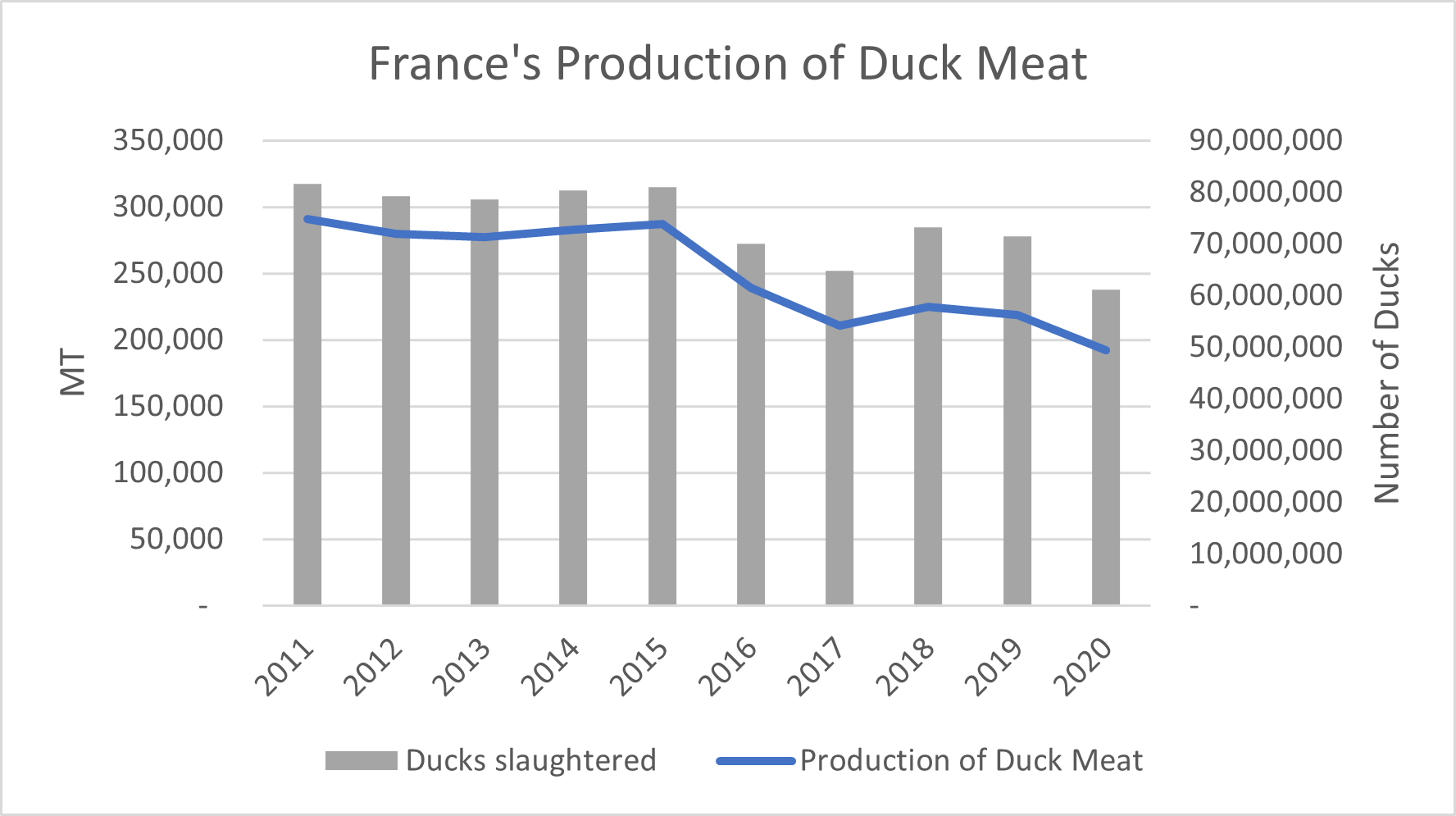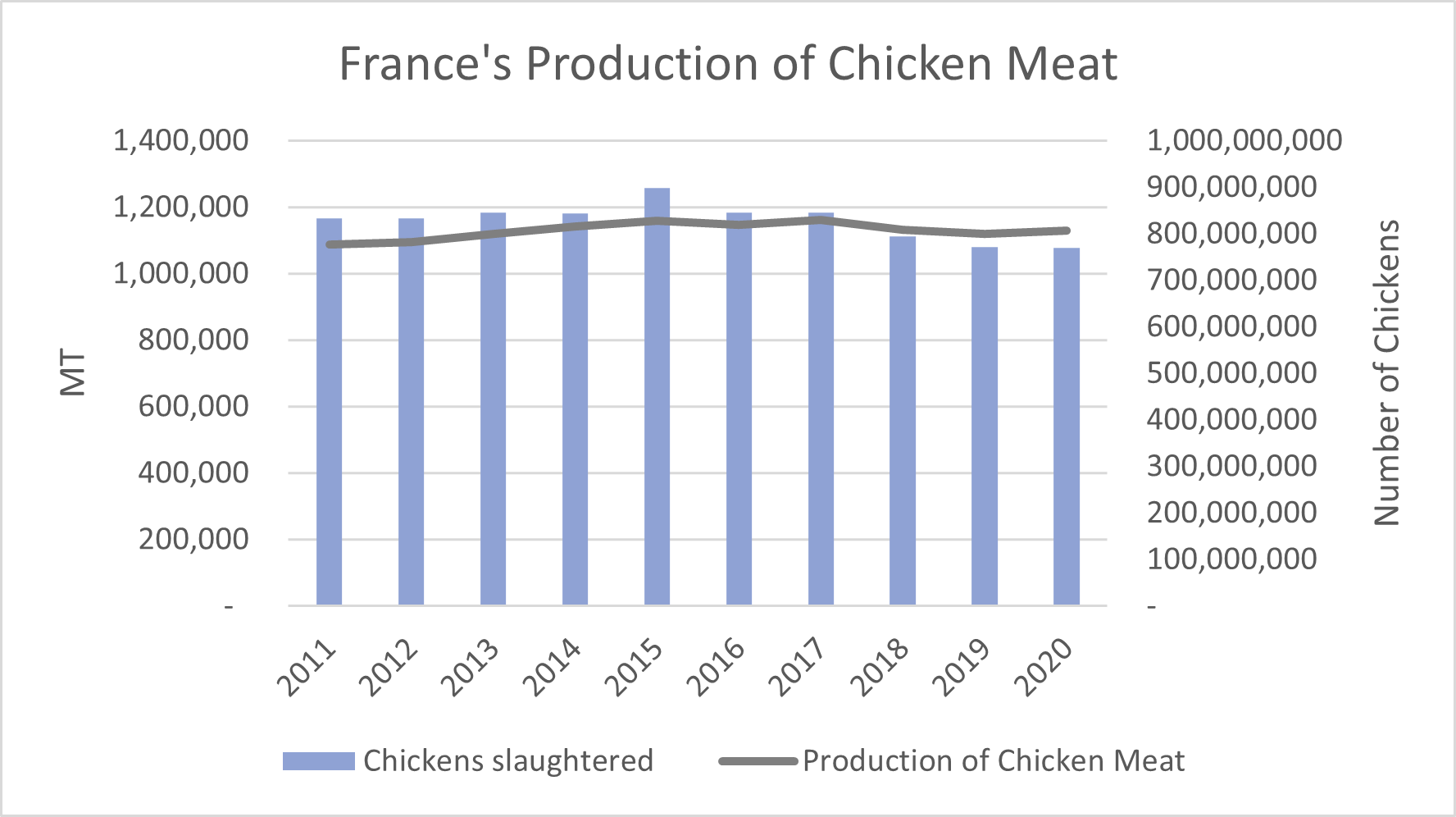New wave of bird flu throughout Europe. France culls 600,000 birds in December

Avian influenza
Avian influenza or bird flu is a viral disease that affects wild and domestic bird species, as well as mammals. The virus is highly contagious and can spread quickly through commercial farms where animals are in close contact with each other, however, migratory wild birds can easily carry the virus from almost anywhere around the globe. Avian influenza outbreaks occur mostly in winter months and according to the World Organization for Animal Health (OIE) cases where 50% of the flock was wiped out are common. Currently, the only viable measure of control is to cull all infected animals to prevent the spread of the virus.
Bird flu can also infect mammals, but symptoms are usually fairly mild. These mammals do however facilitate the spread of the virus.
The virus can also be transmitted to humans who are in close contact with these animals, and although symptoms are usually mild, 420 people have reportedly died from the virus. There is no evidence that the virus can be spread through eating poultry or poultry products, but perceptions that these products are unsafe have led to a decrease in demand.
France’s poultry industry
France is the world’s second-largest producer of duck meat, but the dynamics of production have changed as the industry was devastated by 3 major outbreaks of bird flu over the past 5 years, and the possibility of the fourth in the making.
The chicken sector is the largest of the poultry industries, and nearly five times larger than the duck industry. However, the duck industry is more at risk, as the virus has spread to the main duck production regions in the south of France.
For the 5 years ending 2015, France’s duck meat production averaged 284,000 MT. For the 5 years ending 2020, this has dropped to only 217,000 MT.
The foie gras (duck liver pate) industry in France has an estimated value of EUR 250 - 300 million (2017 estimate) and employs 100,000 people directly and indirectly. The virus has spread to commercial farms in this region and could hammer this industry even further after previous outbreaks and weak demand during the Covid-19 pandemic.

Source: FAOSTAT

Source: FAOSTAT
Previous outbreaks
France has had three major outbreaks in the winters of 2015/16, 2016/17, and 2020/21. Since little can be done except the major culling of birds, this has led to massive losses. The outbreak in 2015/16 has been the most devastating on record for France. While the number of culls compared to the total number of poultry slaughtered seems minute, the ability of the virus to spread rapidly within the poultry sector is the largest concern. Individual farms might suffer catastrophic losses, while others are fairly unscathed.

Sources: FAOSTAT, Various sources
Current situation
The French agricultural ministry has reported the occurrence of bird flu in 26 factory farms, as well as wild bird populations. Even before the virus was detected in France, authorities ordered poultry producers to keep their birds indoors, in an attempt to avoid any outbreaks. The first cases of bird flu were reported in northern France on the 26th of November. The virus has since spread to the southern regions, where it is now concentrated. Another outbreak in a turkey farm in western France was reported on Monday (3rd of January). While these outbreaks have only been documented recently, the situation could worsen rapidly if preventative measures are ineffective.
Outbreaks have been confirmed in nearly all European countries and it is the most widespread outbreak of the virus in Europe on a geographical basis.
Denmark has detected the virus on turkey farms and has begun culling 35,000 turkeys as of Monday. Czech Republic earmarked 80,000 birds to be culled after an estimated 100,000 already died from bird flu at the end of November. Bulgaria culled 39,000 chickens so far and 7,000 ducks are currently being culled. The prevalence of the virus under wild animal populations is another concern, as it can lead to the rapid spread of the virus. Bird flu has even been reported in foxes in the Netherlands, seals in Germany and Sweden, and otters in Finland.
*The map shows the number of cases reported, not the severity of the cases
Source: European Food Safety Authority
Sources
AA: Denmark begins culling thousands of turkeys after new bird flu outbreak
DPA-International: German researchers say Europe has worst-ever avian bird flu epidemic | dpa International
France24: All of France put on 'high risk' restrictions over bird flu
IOWA State University: Avian Influenza Fast Fact
OIE: Avian Influenza
RFI: France set for new mass cull of ducks in third bird flu epidemic in five years





